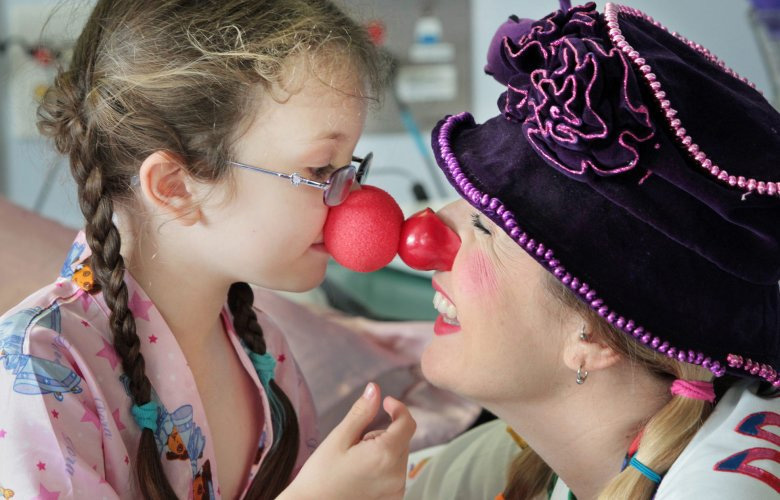The Saturday Paper story: ‘Schlock Therapy: The Clown Doctors of Lady Cilento’, February 2017
A feature story for The Saturday Paper, published in the February 11 2017 issue. Excerpt below.
In hospitals throughout Australia a dedicated troupe of clown doctors dispenses therapeutic comic relief.
In a quiet and unassuming corner of Lady Cilento Children’s Hospital in South Brisbane, a transformation is taking place. Inside a nondescript room are two women who seek to make people laugh so that they might forget their surroundings, if only for a few moments.
Standing before a mirror in a small room, Jenny Wynter applies eyeliner to complement the bright red circles painted onto her cheeks, before picking up a watermelon-adorned ukulele to tweak its tuning. Louise Brehmer secures a series of rainbow-coloured hair ties into her pigtailed locks, dons a purple bucket hat, and fills the pockets of her white lab coat with an array of props. The final touch? Bright red noses, naturally, for a clown can feel only naked without one.
Affixed to the lockers that occupy the back wall are photographs of six clown doctors, who work in pairs to prowl the bright-green building while spreading mirth. For a few hours at a time, these women dress up to stand out. They seek to become the lowest-status person in every room they enter; they aim for nothing more than to become the butt of their own jokes. When the red noses are on, they’re professional goofs. They act as outrageously as possible to make everyone around them feel better about themselves. “There’s not many jobs where walking down a corridor elicits a smile,” says Brehmer of their eye-catching costumes. “We’re here for the entire hospital, to bring an element of lightness to a serious place.”
Brehmer has been doing this work for 16 years, and considers it a valuable addition to her career as a freelance actor. “I’m still learning,” she says. “Some days, I have no idea what to do in a situation.” Wynter is a comparative newbie: her background is in stand-up comedy, and she has been a qualified clown doctor since June 2016, having completed her “clownternship” after making 50 appearances in the role. “It’s so much about reading the room, and being willing to change at any point,” she says. “You’ve got to show up with an open heart.”
On leaving the change room, they switch from friendly colleagues to partners in comedic crime. In the hallway outside, near an immunisation centre, they embrace and address each other by their stage names for the first time today. “Hello, Wobble!” says Wynter, who is now known as Doctor Angelina Jolly.
As soon as they round the corner, they join the general population of the public hospital’s bustling second floor, and the improvised routine begins in earnest. Within the first five minutes of finding an audience, Doctor Jolly blows bubbles and distributes squares of toilet paper to some bemused boys, Doctor Wobble uses her stethoscope to check the heart rate of a visitor’s stuffed panda, and the pair of them launch into an enthusiastic rendition of “Twinkle, Twinkle, Little Star”, accompanied by Doctor Jolly’s ukulele. “A lot of the day is just spent cracking each other up,” says Wobble, while they ride an elevator up to the sixth floor.
To read the full story, visit The Saturday Paper. Above photo credit: Jodie Richter.
